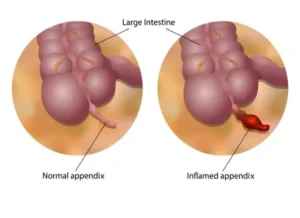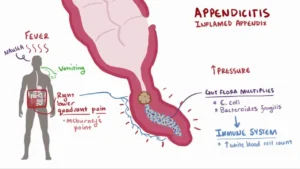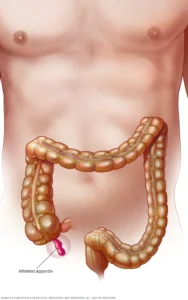Understanding Appendicitis: Causes, Symptoms, and Treatment
What is Appendicitis?
Appendicitis is a medical condition characterized by the inflammation of the appendix, a small, tube-like structure attached to the large intestine. This condition requires immediate medical attention as it can lead to serious complications if left untreated.
Causes of Appendicitis
The exact cause of appendicitis is not always clear, but several factors may contribute to its development:
- Blockage: The most common cause is the blockage of the appendix’s opening. This blockage can be due to hardened stool, a foreign body, or even cancer.
- Infection: Gastrointestinal infections can sometimes trigger appendicitis.
- Enlarged Lymphoid Follicles: These can swell and block the appendix.
Symptoms of Appendicitis
Appendicitis symptoms can vary, but the most common ones include:
- Abdominal Pain: Typically begins around the navel and then shifts to the lower right abdomen.
- Nausea and Vomiting: Often accompanies the abdominal pain.
- Loss of Appetite: A common symptom due to the abdominal discomfort.
- Fever: A mild fever may be present.
- Digestive Issues: Symptoms like constipation or diarrhea can also occur.
Diagnosing Appendicitis
Diagnosing appendicitis involves a combination of physical exams, laboratory tests, and imaging studies:
- Physical Examination: Doctors check for tenderness in the lower right abdomen and specific signs such as rebound tenderness (pain upon releasing pressure).
- Blood Tests: Elevated white blood cell count may indicate an infection.
- Imaging Tests: Ultrasound, CT scans, or MRI can confirm the diagnosis by showing an inflamed appendix.
Treatment for Appendicitis
The standard treatment for appendicitis is surgical removal of the appendix, known as an appendectomy. This can be performed in two ways:
- Open Appendectomy: A traditional surgery with a single large incision in the lower right abdomen.
- Laparoscopic Appendectomy: A minimally invasive surgery using several small incisions and a camera to guide the procedure.



Post-Surgery Recovery
Recovery from an appendectomy varies but generally includes:
- Hospital Stay: Usually, 1-2 days for laparoscopic surgery and 2-4 days for an open appendectomy.
- Activity Restrictions: Patients are advised to avoid strenuous activities for a few weeks.
- Follow-Up: Regular check-ups to monitor the healing process and prevent complications.
Complications of Appendicitis
If not treated promptly, appendicitis can lead to serious complications:
- Ruptured Appendix: This can cause peritonitis, a severe infection of the abdominal cavity.
- Abscess Formation: Pus-filled abscesses may form around a burst appendix.
Preventing Appendicitis
There is no sure way to prevent appendicitis, but maintaining a diet rich in fiber from fruits and vegetables may reduce the risk of blockage that can lead to the condition.
Conclusion
Appendicitis is a common and urgent medical condition that requires prompt diagnosis and treatment. Understanding its symptoms and seeking immediate medical care can prevent complications and ensure a full recovery. If you experience symptoms associated with appendicitis, it is crucial to consult a healthcare provider immediately.







